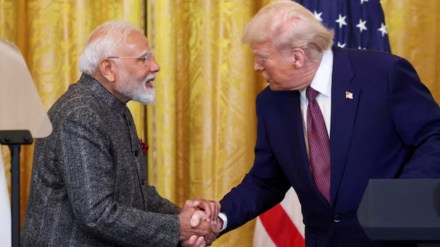US President Donald Trump’s scathing jibe at the BRICS forum has cast another dark shadow over the nation’s trade deal with India. On Tuesday, the Republican leader threatened to slap an additional 10% tariff on any country aligning itself with the “Anti-American policies of BRICS” by challenging the US dollar’s dominance.
Both countries’ leaders have long maintained that their relationship is in good shape and promised that they will seal the India-US trade deal by the fall of this year. However, the additional tariff threat has further cast doubt on where the situation between the nations is headed.
Ironically, Trump’s latest foreboding remarks followed the day he claimed that he was close to finalising a trade deal that could give New Delhi reprieve from 26% reciprocal tariffs.
India-US trade deal delay explored
In its bid to ensure a clear path to the conclusion of the potential deal, India has held back – unlike Brazil and South Africa – from unloading on the US leader for his statements about tariffs that seek to distort trade relationships. New Delhi officials dispelled any thoughts of fears inspired by Trump’s alarming claims, as per Bloomberg.
They further noted that while Trump is going up against BRICS nations for undermining the US dollar. While in 2022 Russia raised a proposition about creating a new international reserve currency that would be deemed a single BRICS currency, nations still appear to be divided on the US dollar replacement claim.
India established it has “absolutely no interest” in hitting it out against the US dollar. Given Trump’s endless warnings against BRICS nations hoping to set up a new payment system undercutting the dollar’s prominence, Indian External Minister Affairs Minister S Jaishankar previously said at the London think tank Chatham House India “has never had a problem” with the American dollar’s dominance. He even described the currency as a “source of international economic stability” at the time, suggesting that India has no plans to replace it.
Trump’s issue with the BRICS members may also lie with how the bloc condemned Israel, along with the US’, attacks on Iran’s “civilian infrastructure and peaceful nuclear facilities.” Although the joint statement did not directly name-drop anyone, it called out the offensive move as a “violation of international law.”
On top of the BRICS development, agriculture and dairy remain pressing issues in the proposed trade agreement between the countries. A source familiar with the case said the ball was in Washington DC’s court now, adding “India is not keen on opening up sensitive sectors of agriculture, particularly dairy and genetically modified crops.”
Given how these sectors fuel the livelihood of a massive chunk of Indians, the insider maintained, “The waiting game is now on. India is firm on protecting its interests. Sealing the deal immediately could take time but it is hoped that it will be done in the coming weeks before July 31.”
Indian officials address US trade deal concerns
Mohan Kumar, a former Indian envoy and lead negotiator at the World Trade Organisation, also pointed out how Trump is unhappy with some BRICS members as they weigh in on bringing up an alternate reserve currency. “India has time and again differentiated between local currency trade and de-dollarisation and therefore doesn’t fall in that category,” he added.
The strength of India-US partnership has recently been under question with Donald Trump declaring himself the prime personality responsible for the ceasefire between India and Pakistan. On the contrary, Indian PM Narendra Modi has refuted the American leader’s insinuation that he employed trade as a bargaining tool to help secure the agreement.
Despite it all, Harsh Vardhan Shringla, former foreign secretary, said in an interview with CNBC-TV18 that the first phase of the India-US trade deal is likely concluded. “I’m told that all discussions have been completed. The entire issue now lies with Washington, mainly the White House, which has to take a final call,” he said.
Opposition lawmaker Shashi Tharoor, who was also part of the diplomatic outreach following the Pahalgam attack and India’s subsequent Operation Sindoor, reiterated that the country’s ties with the US remain in “good shape.” In an interview in London on Tuesday, he suggested that with India already having pushed forward its proposal to Washington, the awaited trade deal, if agreed, will signal “a very, very healthy sign.”
